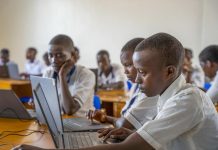Africa-Press – South-Africa. Basic Education Minister Angie Motshekga announced the matric pass rate on Thursday on the back of two disruptive years in the education sector.
Among the challenges the 2022 matriculants had to overcome to obtain the 80.1% pass rate were the Covid-19 pandemic, natural disasters and load shedding.
Equal Education estimates that the class of 2022 lost at least three-quarters of a school year between 2020 and 2021 due to long periods away from the classroom and rotational school attendance.
“These learners have undoubtedly had to work extremely hard to overcome severe learning gaps and have had to catch up on large parts of the curriculum to make it to this point,” the organisation said in a statement.
Research associate at the University of Johannesburg (UJ) Professor Mary Metcalfe said it wasn’t surprising to see the impact of the pandemic on the matric results.
She added:
However, Metcalfe said the impact of the pandemic on foundation-phase learning was likely to continue and that there could be a long-term impact on results.
Equal Education said the 2022 matriculants grappled with load shedding, which impacted teaching and learning time and likely exacerbated the learning losses caused by the pandemic.
“Load shedding also widened inequality in the sector as learners attending schools in rural and working-class communities were disproportionately affected. For instance, over 100 examination centres and nearly 4 000 learners were affected by load shedding during the exam period, to the extent that learners writing their final Computer Applications Technology (CAT) and Information Technology examinations were left unable to complete them,” Equal Education said.
“The official examination timetable had to be extended to accommodate learners who had to rewrite these subjects. Although the opportunity to rewrite was necessary, the psychosocial impact of a rewrite cannot be overstated, especially given the stressful conditions in which these learners prepared and wrote,” it added.
Pupils in KwaZulu-Natal faced an additional challenge: heavy rainfall and flooding in April last year damaged school infrastructure, Equal Education said.
“While the Department of Basic Education (DBE) provided emergency mobile classrooms and accommodated learners in community halls, learner attendance remained irregular, once again negatively affecting teaching and learning time and preparation ahead of the examinations,” said Equal Education.
Professor Nadine Petersen, UJ’s executive dean of the Faculty of Education, said she had anticipated some dips in certain subjects due to the challenges faced by the 2022 matrics.
“We have to consider that this is the group who really felt the brunt of the lockdown and the reduction of classes. Even when schooling returned, many learners had to adjust to online classes. Preparing for matric is not the work of one year. The preparation begins in Grade 10. It’s a three-year journey, and the disruption to the first year of that journey was really problematic,” said Petersen.
She added that not all schools were equipped for online teaching or to support pupils in moving towards online classes.
She added:
Petersen said she expected to see lower results in some of the more technical subjects, including Mathematics.
She added that while the Department of Basic Education had worked hard to implement catch-up programmes, not every child would have had the same level of access to them.
“We can never underestimate the difference in public schools, which range from quintile 1 (no-fee schools with few resources) to wealthier quintile 5 schools. The support for learners wasn’t equal, even though the department did a lot. For example, while there were classes available on Saturdays and Sundays, some children did not have money to travel to school to attend these,” she said.
Professor Murthee Maistry, an education expert at the University of KwaZulu-Natal, said historically disadvantaged schools in lower-income areas were the most likely to feel the impacts of the challenges that faced last year’s matrics.
He added that the matric results showed the disparity between schools in the education system.
“We have a dual system of wealthy schools alongside really poor township and rural schools. Those poorer schools are the ones that are most likely to feel the effects of Covid-19, riots and unrest, and load shedding,” he said.
“Children in affluent areas, who have parents who can afford substitutes for electricity managed quite well. But for others in poorer areas, when the lights go out, they go out.”
Maistry said the system was unlikely to change without the government addressing the severe lack of infrastructure at many schools.
“The minister may romanticise stories of learners from poorer areas who have excelled in their matric exams, but these children are the exception. Many children still come to school hungry and for the sole reason of getting a meal, and they can’t be expected to perform alongside their counterparts at richer schools,” he said.
For More News And Analysis About South-Africa Follow Africa-Press






